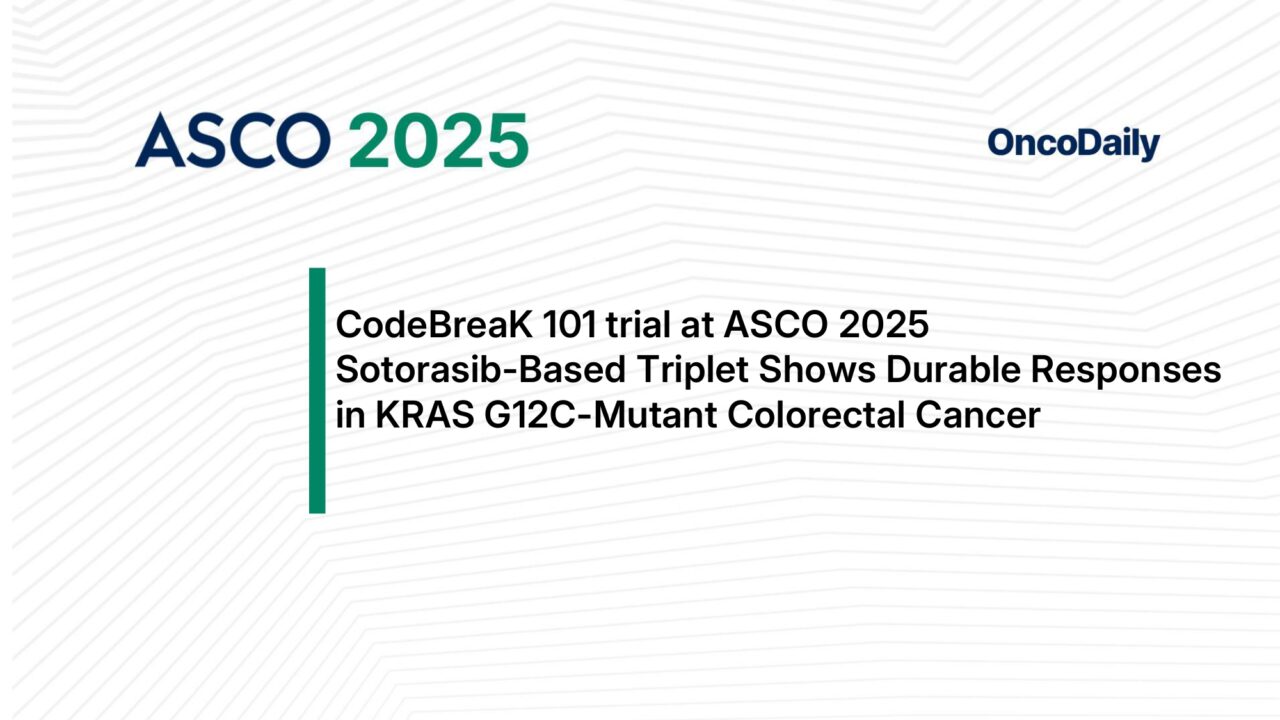Fresh from the stage at ASCO 2025! Dr. John H. Strickler of Duke University Medical Center presented the first mature survival data from the CodeBreaK 101 Phase 1b trial (subprotocol H), spotlighting a promising triplet regimen for patients with KRAS G12C-mutated metastatic colorectal cancer (mCRC). The combination of sotorasib, panitumumab, and FOLFIRI delivered robust and durable responses in previously treated patients—offering a new avenue of hope for a historically hard-to-treat molecular subset.
Background
KRAS G12C mutations are present in approximately 3–4% of metastatic colorectal cancer (mCRC) cases and represent a molecular subset with historically limited treatment options. These tumors are typically resistant to standard chemotherapy and have shown suboptimal responses to EGFR-targeted therapies alone. Sotorasib, a first-in-class KRAS G12C inhibitor, has demonstrated antitumor activity in chemorefractory settings. In the CodeBreaK 300 trial, the combination of sotorasib and panitumumab, an anti-EGFR monoclonal antibody, improved clinical outcomes compared to chemotherapy in KRAS G12C-mutated mCRC, establishing the potential of dual pathway blockade.
Building on this, the CodeBreaK 101 Phase 1b trial (subprotocol H) explored the addition of FOLFIRI—a standard chemotherapy backbone consisting of leucovorin, 5-fluorouracil, and irinotecan—to the sotorasib and panitumumab regimen. The goal was to assess whether triplet therapy could further enhance efficacy in patients who had received at least one prior systemic therapy but had not been exposed to KRAS G12C inhibitors.
Study Design
CodeBreaK 101 (NCT04185883) is a multicenter Phase 1b trial evaluating the safety and efficacy of sotorasib combinations in solid tumors. In subprotocol H, 40 patients with previously treated KRAS G12C-mutant mCRC received the following:
Sotorasib 960 mg orally, daily
- Panitumumab 6 mg/kg IV, every 2 weeks
- FOLFIRI (5-fluorouracil, leucovorin/levoleucovorin, irinotecan), standard dosing, every 2 weeks
Eligible patients had received at least one prior line of systemic therapy. The primary endpoint was safety, with objective response rate (ORR), progression-free survival (PFS), overall survival (OS), and duration of response (DoR) as secondary endpoints.
Results
After a median follow-up of 29.2 months, the combination of sotorasib, panitumumab, and FOLFIRI demonstrated encouraging and durable efficacy in previously treated KRAS G12C-mutant mCRC.
Efficacy outcomes included:
- Objective Response Rate (ORR): 57.5% (95% CI: 40.9–73.0)
- Disease Control Rate (DCR): 92.5% (95% CI: 79.6–98.4)
- Median Time to Response: 1.6 months
- Median Duration of Response: 6.6 months
- Median Progression-Free Survival (PFS): 8.2 months (95% CI: 7.0–10.8)
- Median Overall Survival (OS): 17.9 months (95% CI: 12.9–25.1
At the time of analysis:
- 7 patients remained in the study
- 5 of them were off treatment but under follow-up
Safety profile was consistent with known toxicities of the regimen:
- Grade ≥3 TRAEs in 50% of patients
- Most common treatment-related adverse events:
- Dermatitis acneiform: 67.5%
- Dry skin: 67.5%
- Neutropenia: 50.0%
- Stomatitis: 42.5%
Discontinuation due to adverse events was infrequent for the targeted agents, with only 2.5% of patients stopping either sotorasib or panitumumab. In contrast, 40.0% of patients discontinued at least one component of the FOLFIRI chemotherapy regimen. Importantly, no new safety signals were observed, and the toxicities encountered were generally manageable with appropriate dose modifications.
Key Takeaways
- The triplet combination of sotorasib, panitumumab, and FOLFIRI produced a confirmed response rate of 57.5% and disease control in over 90% of patients.
- Responses were rapid (1.6 months to onset) and durable (median duration 6.6 months).
- Median PFS of 8.2 months and OS of 17.9 months compare favorably to historical data in this population.
- The toxicity profile was predictable and manageable, with only 2.5% discontinuation for sotorasib or panitumumab, despite 40% for FOLFIRI.
- The data support expanding KRAS G12C-directed therapy beyond dual blockade, reinforcing the role of targeted therapy plus chemotherapy.
Clinical Implications
This is the first report of long-term outcomes for a KRAS G12C-targeted triplet in mCRC. For a mutation long considered “undruggable,” these results signal a meaningful advance—offering both depth and durability of response in patients with limited remaining options. Importantly, the high ORR and OS were achieved despite patients being heavily pretreated.
The favorable safety and tolerability of sotorasib and panitumumab, combined with the cytotoxic backbone of FOLFIRI, also point toward practical implementation in clinical settings.
You cand find the abstract here


